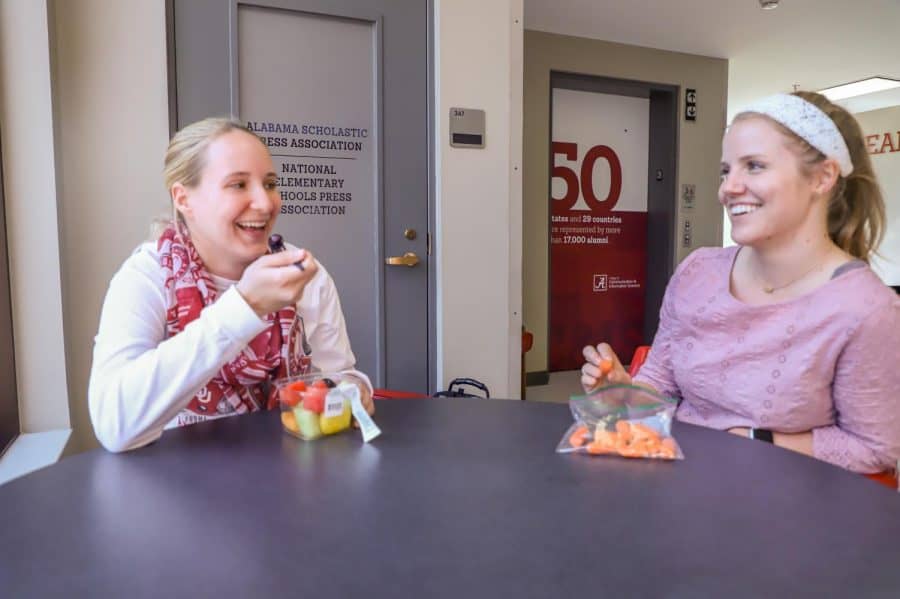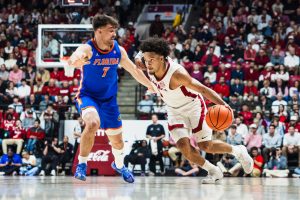National Nutrition Month emphasizes healthy lifestyles
March 21, 2019
As a college student, it can be difficult to consume the proper nutrition a young adult body needs to function efficiently. While it might seem easier to grab a burger and fries between classes, that meal will not provide the energy students need to continue their schedule throughout the day.
The Academy of Nutrition and Dietetics established March as National Nutrition Month. The month is focused on the importance of intaking the proper nutrition and participating in regular exercise to live a healthy lifestyle.
“The month of March is known as National Nutrition Month, and of course, as a campus dietician, I always get excited about this time of the year because it really is a month that’s focused on promoting messages that support a healthy lifestyle through eating and exercise for the community and for us, specifically the UA community,” said Sheena Gregg, the assistant director of the Department of Health Promotion and Wellness in the Student Health Center.
Gregg said her mission is to ensure that students are forming healthy eating habits. She teaches students about the proper nutrients their bodies need each day by incorporating vegetables, fruit, protein, good carbohydrates and dairy to maintain a healthy diet.
“My main mission as a campus dietician is really to equip our students here at UA with the nutrition knowledge to feel confident in making good nutrition decisions,” Gregg said. “I think a lot of times, we get caught up following very specific diets or even pre-planned menus from the internet, and it leaves us without the knowledge that we need to put together meals on our own and really to understand the role and the benefit of different food groups and even different nutrients like carbohydrates, protein and fat.”
It is important for students who want to try a new diet or are seeking healthier foods to know how to navigate correct information on the internet. Gregg said students need to do research before participating in any diet to ensure it is the right choice for their body.
“I think that college, in particular, is a very pivotal time for students to develop habits that really shape the rest of their adulthood, and nutrition is one of those components that I think really needs to be focused on because we start to develop those eating habits,” Gregg said.
Gregg said it is common for students to get into a culture where they are eating pre-planned menus but not understanding why they are eating the combinations of foods that they are intaking. It is Gregg’s job to give students the knowledge to make the right decisions independently and to feel confident when purchasing foods at the grocery store.
Gregg suggests students keep a food diary to track their daily nutritional intake. Apps provide an easy way for students to account for their diet, but Gregg offers a caveat: It may trigger those who suffer from eating disorders such as anorexia or bulimia. Gregg said students need to focus not on the calorie numbers, but on the food groups.
Jessica Celmer, a junior majoring in exercise science, said students need to focus on being healthy physically and mentally by eating right, taking part in regular exercise and listening to their bodies.
“We’re in a really important time developmentally, so it’s really important for our bodies to get proper nutrition so that we can pay attention in class,” Celmer said. “We’re basically at our prime to perform to the best of our abilities, no matter if it’s physical performance like sports or a more active job, or even just cognitive performance, you know, doing math, doing science, stuff like that.”
Celmer has been vegan for three years now and she believes this motivates her to stick to plant-based diets and stay away from processed foods. Personally, Celmer follows the USDA guidelines for healthy eating, allowing her to eat the proper amount of fruit, vegetables and whole grains.
“I try to plan ahead and bring food with me because all of my days are long days, so I literally fill up my backpack like a lunchbox and I bring loads of snacks and things I can take with me,” Celmer said. “Some of my favorites are little snack packets of almond butter, or I’ll bring, like, a sandwich or something like that with a cold pack.”
When Celmer is in a pinch, she grabs a Clif Bar or goes to Blenz Bowls food truck to maintain her healthy diet while on campus. Celmer said it is important for students to remember moderation.
It is also important, Celmer said, for students to exercise each day. Whether it is moderate or intense, exercise can act as a stress reliever for students and helps keep their bodies active.
“Exercise can be such a great stress reliever,” Celmer said. “It gets you out of your mind and into your body. It’s just been proven time and time again that students who exercise regularly are happier, healthier and perform better than students who don’t.”
Celmer stays active by attending the gym at least five times a week. She focuses on cardio, strength training and resistance training.
Though it is important for students to receive the proper nutrition, some do not have access to it due to food insecurity.
Caitlyn McTier, a junior majoring in news media, is the reigning Miss Tuscaloosa for the Miss America Organization. McTier’s platform is centered on food insecurity by promoting the student-led task force Project Fierce, which stands for Food Insecurity, Education, and Recharging Civic Engagement. Project Fierce has a mission to end food insecurity on the University of Alabama’s campus.
“When it comes to food insecurity, a lot of times people cross out the difference between food insecure and hunger,” McTier said. “Food insecurity is like lack of ability to have sustainable foods, where hunger is actually skipping out on meals, so a lot of people find themselves more food insecure.”
For example, some shoppers may need to compromise when going to the grocery store with only $10. They may realize the fruit they need is $3 and a pack of ramen noodles is 15 cents. Shoppers who suffer from food insecurity have to make this decision everyday, but McTier suggested people plant their food to help save money and get the proper nutrients.
“My grandad always had a garden in his backyard, so I grew up learning the importance of eating healthy while also, like, seeing that you can do it cheaper by planting it yourself, and so when I show it to other people, I show people that you can plant your own healthy foods,” McTier said. “For example, I am a big advocate for the Tuscaloosa River Market. They have fresh produce for reduced prices in comparison to grocery stores and they also accept food stamps or EBT cards.”
Food drives are not only held during National Nutrition Month, but throughout the year to fight food insecurity and hunger in communities. It is difficult at times because food drives accept mostly non-perishable items. McTier said those who decide to donate need to look at the labels of foods they donate. It is helpful to donate foods that has less sodium and more nutritional benefits to help those in need receive the proper nutrition.
“When you’re donating to different food drives, whether it be on campus, Beat Auburn Beat Hunger or the West Alabama Food Bank or stuff like that, when you pick up things to donate to other people that are in need, pick up something that you would want to eat,” McTier said. “Don’t just pick up maybe the cheapest canned food that’s on the grocery shopping aisle, but pick something up that might be a little bit more expensive.”
Celmer said students need to set a schedule that makes it easy for them to live a healthy lifestyle, not only during National Nutrition Month, but everyday. She suggested students stay away from takeout and make meals on their own. Most importantly, she said, students always need to make sure they’re not eating less, but eating enough.
“Make the healthiest choices that you can,” Celmer said. “Do your own research, find out what works for you and at the end of the day, just listen to your body. Do things that are going to make your body and yourself just feel better at the end of the day.”
















![NEWS | The University provided the UA Young Americans for Freedom chapter an exception to a required non-discrimination clause for student organization constitutions that prohibits barring membership based on characteristics of personal identity.
The exception for the conservative political organization allows it to use a modified version of the required non-discrimination statement excluding wording prohibiting discrimination based on a student’s “gender identity, gender expression, [or] sexual identity.”
“We were not about to be bullied by this new gender ideology cult infecting the University of Alabama administration,” Trenton Buffenbarger, president of UA YAF, said in an article on the YAF website.
After UA YAF applied to renew its organization with The Source, an annual requirement for student organizations, the Source rejected the application. A University employee stated in an email reply to UA YAF that it was required to include a nondiscrimination clause in its constitution with the “EXACT” wording, noting that UA YAF would remain in “frozen status” until it complied.
The chapter pushed back against this required clause, as it included references to gender identity and sexual identity.
Buffenbarger said in an interview with The Crimson White that he saw this as an attack on “basic free-thinking students,” adding he believes that welcoming in someone who not only fundamentally disagrees with the organization on “ideology,” but encourages the opposing ideology, is wrong.
“UA tried to force us to not only comply, but to explicitly put something we disagree with in writing in our constitution,” Buffenbarger said. “It is a violation of the First Amendment.”
📸 CW / Riley Thompson
🖊️ CW / Cameron Cortez
Read the full story at the link in our bio.
#theuniversityofalabama #universityofalabama #alabama #uofa #ua #crimsontide #rolltide #tuscaloosa #tuscaloosaalabama #alabama #bama](https://scontent-ord5-2.cdninstagram.com/v/t51.75761-15/482193306_18487676404025566_4501943912441479788_n.jpg?stp=dst-jpg_e35_tt6&_nc_cat=102&ccb=1-7&_nc_sid=18de74&_nc_ohc=pLXTwrWP9coQ7kNvgHkV07w&_nc_oc=AdhUQfD1xfZrxv77n_79dzOrOhVq0im3JADNkXPT63SC44sglLVZjHoVwage5uQaN2w&_nc_zt=23&_nc_ht=scontent-ord5-2.cdninstagram.com&edm=AM6HXa8EAAAA&_nc_gid=Oq07xO8wED70y1X0-7JLyQ&oh=00_AYGSZ_Uiv-DlP2bPG26MmhAzIeSDZIlETMgumH9ZElK5Og&oe=67DAA022)




